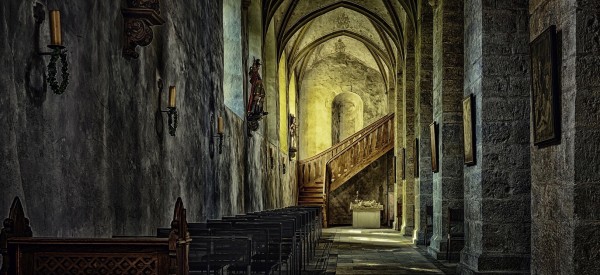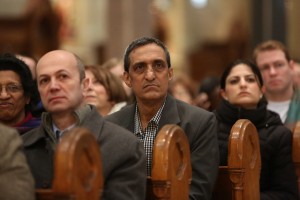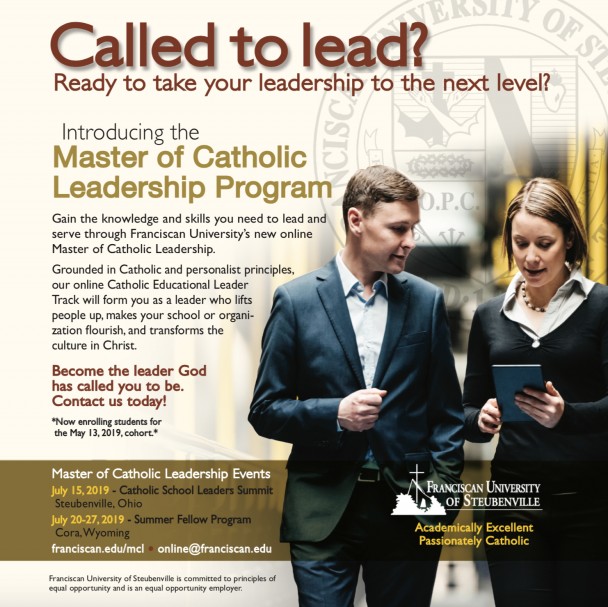La evangelización: clara y sencilla
Estamos en un siglo de inventos. Ahora no hay que tomarse ya el trabajo de subir los peldaños de una escalera. … Yo quisiera también encontrar un ascensor para elevarme hasta Jesús, pues soy demasiado pequeña para subir la dura escalera de la perfección. … ¡El ascensor que ha de elevarme hasta el cielo son tus brazos, Jesús! Y para eso, no necesito crecer; al contrario, tengo que seguir siendo pequeña, tengo que empequeñecerme más y más.
Santa Teresita del Niño Jesús, La historia de un alma
Estas palabras sencillas, pero profundas, de Santa Teresita la Pequeña Flor ilustran algo revolucionario que he llegado a comprender acerca de cómo ser efectivo y fructífero en nuestros esfuerzos de evangelización en la cultura altamente secularizada en la que vivimos hoy en día. Hay una manera más fácil y más eficiente para invitar a esta generación a que abra su corazón a Jesucristo y, por la gracia, conducir a los hombres a una conversión profunda que les cambie la vida.
Para abrazar este sencillo enfoque a la evangelización, primero tendremos que reconocer el hecho de que ya no nos hallamos en la Cristiandad – el catolicismo cultural ha muerto. Por lo tanto, las condiciones para un camino a la conversión son muy distintas de las del pasado: “En nuestro tiempo, en el que en amplias zonas de la tierra la Fe está en peligro de apagarse como una llama que no encuentra ya su alimento…Dios desaparece del horizonte de los hombres y, con el apagarse de la luz que proviene de Dios, la humanidad se ve afectada por la falta de orientación, cuyos efectos destructivos se ponen cada vez más de manifiesto.
He visto, por medio de mi compromiso por evangelizar a los estudiantes de las universidades a lo largo y ancho de Canadá durante los últimos treinta años, que hay una creciente resistencia y oposición a la Iglesia y a lo que ella propone. Lo que es aparente es la falta de interés en las devociones de la Iglesia que en otro tiempo condujeron a nuestro pueblo hacia una conversión continua mayor. Mucha de nuestra gente no ve la relevancia de nuestros sacramentos, se opone a nuestras doctrinas, les tiene mucha antipatía a nuestros dirigentes, y opinan que gastamos demasiado dinero en nuestras hermosas iglesias.
Lo que es evidente es la creciente polarización entre los católicos que viven la Fe y las grandes multitudes que se han alejado de la Iglesia. Como resultado, ya no nos debemos de esperar a que el camino común a una vida católica vaya a ser el mismo. A medida que crezca la brecha entre los creyentes y los no creyentes, los evangelizadores deben de estar listos para navegar conversiones que son significativamente más decisivas y dramáticas.
El camino comprobado y cierto hacia una conversión más profunda y continua sigue siendo relevante para las personas establecidas dentro de la Iglesia, pero para las enormes multitudes que no están dentro de la Iglesia, que no conocen a Cristo o que no lo conocen suficientemente bien, consideremos un camino más rápido. Santa Teresita, quien se inspiraba en el heroísmo y fortaleza de carácter de los grandes santos, se consideraba incapaz de seguirles: “soy demasiado pequeña para subir la dura escalera de la perfección”. Descubrió una nueva vía hacia la perfección presentándose sencillamente al Padre como niña pequeña, pidiéndole que la tomara en sus brazos para experimentar su Amor: “¡El ascensor que ha de elevarme hasta el cielo son tus brazos, Jesús!”
Reconociendo cuán lejos se han alejado de la Fe muchos de esta generación, invitémosles a que entren por medio de un ascensor, que abran su vida a una relación con Jesucristo. Esta relación de amor les abrirá los ojos a la belleza de la Iglesia Católica y a un deseo mayor de una conversión más profunda y continua. Dicho esto más claramente, debemos de comenzar por medio de la evangelización y darle seguimiento con la catequesis.
El Sínodo sobre la Nueva Evangelización del 2012 intentó traer claridad al lugar de la evangelización dentro de la Iglesia. Lo que se hizo patente entre los participantes fue la confusión en lo que se refiere al mensaje que debemos de proclamar. Para fomentar una mayor claridad, el Sínodo le propuso al Papa Benedicto XVI la necesidad de desarrollar “una enseñanza sistemática sobre el kerigma” que pudiera utilizarse para formar a los fieles en su obra de evangelización.
En mi experiencia, la evangelización es fructífera y efectiva cuando el evangelizador habla de forma clara y sencilla y tiene confianza en el poder sobrenatural del mensaje evangélico para cambiar vidas. Examinemos cinco principios para un proceso efectivo y fructífero de evangelización que comience con un encuentro con Jesús.
Evangelization: Clear and Simple
"We are living now in an age of inventions, and we no longer have to take the trouble of climbing stairs … I wanted to find an elevator which would raise me to Jesus, for I am too small to climb the rough stairway of perfection … The elevator which must raise me to heaven is Your arms, O Jesus! And for this I had no need to grow up, but rather I had to remain little and become this more and more." St. Thérèse of Lisieux, The Story of a Soul
photo of crowd going up escalator by Johannes Wünsch at Pixabay.com
These simple but profound words of St. Thérèse the Little Flower illustrate something revolutionary I’ve come to understand about how to be effective and fruitful in our evangelical efforts in today's highly secularized culture. There is an easier and more efficient way to invite this generation to open their hearts to Jesus Christ and, by grace, lead them to a profound life changing conversion.
To embrace this simple approach to evangelization we will first have to come to terms with the fact that we are no longer in Christendom—cultural Catholicism is dead. Therefore, the conditions for a path to conversion are very different than in the past: “In our days... in vast areas of the world the faith is in danger of dying out like a flame, which no longer has fuel... God is disappearing from the human horizon and, with the dimming of the light, which comes from God, humanity is losing its bearings, with increasingly evident destructive effects.[1]
I have seen, in my commitment to evangelizing students on campuses across Canada for the last thirty years, that there is a growing resistance and opposition to the Church and what she proposes. What is apparent is the lack of interest in the Church’s devotions that at one time led our people to greater ongoing conversion. Many of our own people don't see the relevance of our sacraments, they oppose our doctrines, they dislike our leaders, and they think we spend too much money on our beautiful churches.
What is evident is the growing polarization between Catholics living the faith and the great multitudes that have wandered far away from the Church. As a result, we must no longer expect that the common pathway to a Catholic life will continue to be the same. As the gap between believers and non-believers grows, evangelizers must be ready to navigate conversions that are significantly more decisive and dramatic.
While the tried and tested path to deeper and ongoing conversion is still relevant for those established within the Church, for the great multitudes who are not in the Church, who do not know Christ or do not know him well enough, let us consider a quicker path. St. Thérèse, who was inspired by the heroism and strength of character of the great saints, thought herself unable to follow them: “I am too small to climb the rough stairway of perfection.”[2] She discovered a new way to perfection by simply presenting herself to the Father as a little child, asking to be taken up in his arms to experience his love: “The elevator which must raise me to heaven is your arms, O Jesus!”[3]
Recognizing how far many in this generation have wandered away from the faith, let us invite them to enter by way of an elevator, opening their lives to a relationship with Jesus Christ. This relationship of love will open their eyes to the beauty of the Catholic Church and a greater desire for deeper and ongoing conversion. More clearly stated, we must lead with evangelization and follow up with catechesis.
The Synod on the New Evangelization in 2012 attempted to bring clarity to the place of evangelization within the Church. What became evident to those participating was the confusion surrounding the message we are to proclaim. To help bring about greater clarity, the Synod proposed to Pope Benedict XVI the need to develop a “systematic teaching on the kerygma” that could be used to form the faithful in their work of evangelization.[4]
In my experience, evangelization is fruitful and effective when the evangelizer speaks clearly and simply and has confidence in the supernatural power of the Gospel message to change lives. Let’s examine five principles of an effective and fruitful process of evangelization that begins with an encounter with Jesus.
La formación en la fe para adultos en la comunidad hispana católica en los Estados Unidos: una reflexión
“La evangelización es la misión fundamental de la Iglesia. Es también un proceso continuo de encuentro con Cristo, un proceso que los católicos hispanos han hecho muy suyo en su planeación pastoral. Este proceso genera una mística (teología mística) y una espiritualidad que conduce a la conversión, comunión y solidaridad, tocando cada dimensión de la vida cristiana y transformando cada situación humana.”[1]
Adult Faith Formation in the Hispanic Catholic Community in the United States: A Reflection
“Evangelization is the fundamental mission of the Church. It is also an ongoing process of encountering Christ, a process that Hispanic Catholics have taken to heart in their pastoral planning. This process generates a mística (mystical theology) and a spirituality that lead to conversion, communion, and solidarity, touching every dimension of Christian life and transforming every human situation.”[1]
On the occasion of this important milestone marking the publication of the USCCB’s seminal document on adult faith formation, Our Hearts Were Burning Within Us (hereafter “the document”), issued on the cusp of the new millennium, it is worth reflecting on its impact and influence on Hispanic ministry in this country. Much has taken place since that time, while significant ongoing challenges remain.
Some Pertinent Principles
Although the document does not explicitly address the Hispanic or other specific cultural communities, a number of its organizing principles do speak to some noteworthy realities. These principles will be the touchstones for this reflection. First, persons will always prefer to worship where they feel comfortable and at home. Second, faith as it relates to the family is a critical factor in any religious tradition. And lastly, social customs and popular devotion in harmony with the Gospel are to be respected, affirmed, and celebrated.
First Things First - Welcoming and Hospitality
While data are generally lacking regarding the number of Hispanics who have left the Catholic Church, current information suggests that a significant number of Hispanics who were baptized as Catholics join other Christian denominations and religious traditions every year; including fundamentalist groups and “storefront” churches—many of which maintain Hispanic cultural traditions that might otherwise be considered to be “Catholic,” including quinceañeras (fifteenth birthday blessings) and Epiphany celebrations. New arrivals often find the structure of the parish and the style of worship to be very different from what they experienced in their native country. In this unfamiliar environment, they are frequently targeted for what could be considered aggressive proselytizing by non-Catholic groups, and are offered transportation, many kinds of assistance, skillful scriptural preaching, as well as a friendly community to which to belong.
All this highlights the compelling need for Catholic parishes to provide a welcoming and hospitable atmosphere to newcomers, including Spanish-language and/or bilingual worship, ministries, parish pastoral leaders, and personnel whenever possible. In addition, Catholic parishes must be aware of several factors that can make Hispanics feel unwelcomed in the Catholic Church and make them more open to seeking a home in other faith traditions. Among these factors are: an unspoken attitude from parish staff or parishioners that they are “undesirable”; excessive or overwhelming administrative rules and forms; and being required to produce evidence of contribution envelopes before they can receive the sacraments.[2]
Our Hearts Were Burning Within Us: A Reflection on Discipleship
Do you feel the Holy Spirit working? Do you sense that deeper calling, that desire for renewal, that burning within your heart? Yes, it is the same burning that the disciples on the road to Emmaus felt as their Lord and Savior journeyed with them.
Our Hearts Were Burning Within Us was written twenty years ago as a prophetic and challenging document calling parishes and dioceses to re-examine the faith formation they are providing to children and adults so that the right priority and emphasis was being lived out. When we see adult faith formation taking a primary role in catechesis, we see adults being transformed by the Gospel to become missionary disciples who go forth to transform the world. In many ways, this document has yet to be fully implemented and embraced, but as it continues to be, parishes and dioceses will see wonderful fruits of disciples ready to run back to the Church, to embrace the call of Christ to evangelize.
If you are anything like me, for much of your journey and even today, we fail to recognize the many times that Christ is present with us in our midst. We have a sense (a burning) of his presence but we aren’t quite ready to fully give ourselves (our work, our ministry, our concerns, etc.) over to him. Just as the disciples wondered, “could it really be true, could he really have risen from the dead?” so do we wonder, “can he really free me from my sin, will he really transform the lives and hearts of those I minister to?” Our work in adult faith formation, as it is in our own lives, is to help form “women and men of prayer whose faith is alive and vital, grounded in a deep commitment to the person and message of Jesus” (2).
From the Shepherds: Catechesis in the Light of the Papal Magisterium of Pope Francis' Evangelii gaudium - An Access to the Church’s Mission

Editor's Reflections: Adult Faith Formation and Culture Change
 This year marks the twentieth anniversary of one of the most important publications the U.S.
This year marks the twentieth anniversary of one of the most important publications the U.S.
AD: NEW Master of Catholic Leadership Online Program
To learn more about this NEW Master's Degree Program in Catholic Leadership click here. Or call (740) 284-5239.The first cohort for this program will start May 13, 2019. It will be capped at 20 students, and there is a March 1, 2019, early deadline.

AD: Discovering Mary, the Church, & the Papacy books by Ignatius Press
This is a paid advertisement in the April-June 2019 issue. Advertisements should not be viewed as endorsements from the publisher.
Youth & YA Ministry: Modern Man Listens More to Witnesses than to Tweeters
 Head buried in her screen, she was more concerned with live-tweeting the event than listening to the speaker. She was so busy scrolling through social media, she didn’t realize she had walked past a friend she hadn’t seen in years.
Head buried in her screen, she was more concerned with live-tweeting the event than listening to the speaker. She was so busy scrolling through social media, she didn’t realize she had walked past a friend she hadn’t seen in years.


